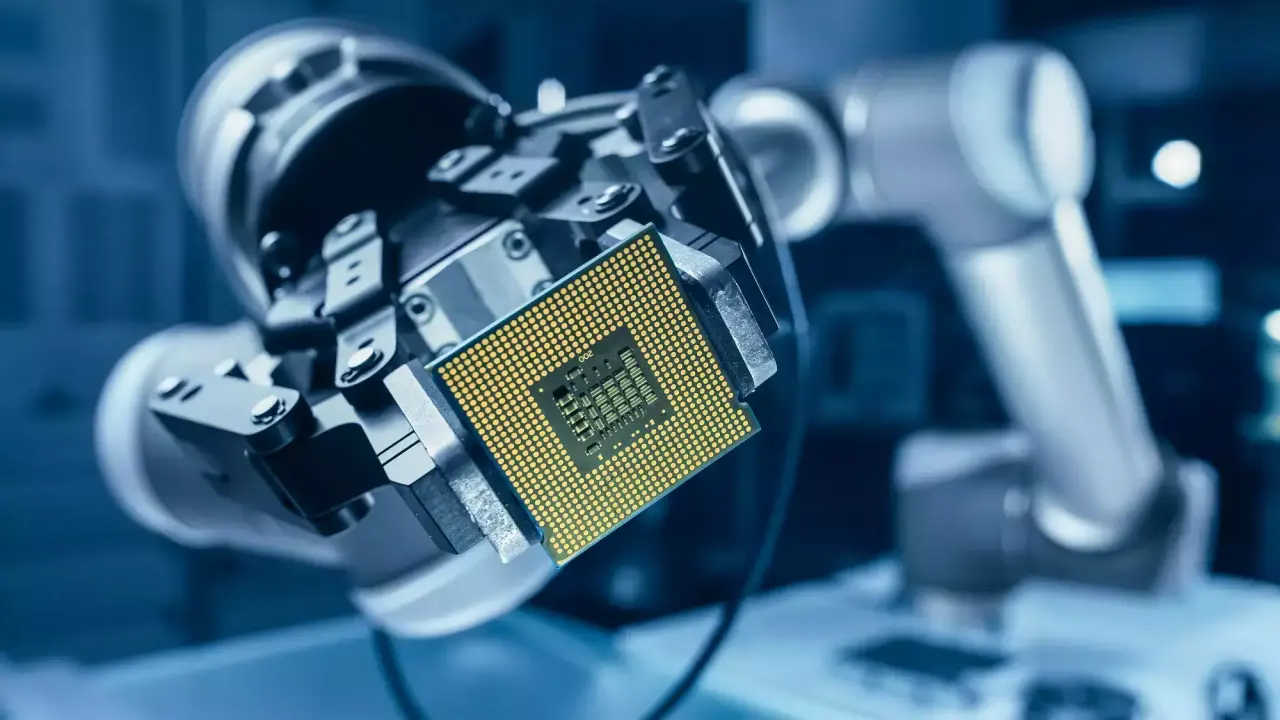News
Samsung’s Expected & Awaited Announcement For 3nm Chips Due This Week

In a recent development, Samsung may announce the start of mass production of its pilot project of what may be the world’s first 3nm chip next week this June.
Samsung also announced in April this year that it will work on 2 nm by 2025. Before this, Samsung also informed in April that it would start to work on the 3nm chips 3GAE (3 nm-class gate-all-around early) fabrication process, starting in mid-2022.
During the 10 days US president’s visit to S.Korea in Samsung’s electronic plant on May 20, it’s believed that Samsung presented the world’s first GAA-based 3-nano chip prototype.
Samsung will imply an advanced GAAFET (gate-all-around field-effect transistor) architecture compared to its archrival TSMC’s FinFET (fin field-effect transistor) for the fabrication method.
This, when completed, would enable a 30% performance increase, a 50% power consumption reduction, and up to 80% higher transistor density, according to Samsung.
If this goes according to plans, then Samsung will become the first manufacturer of semiconductors to start using gate-all-around field-effect transistor (GAAFET) architecture with its upcoming 3 nm fabrication process.
“We are scheduled to begin mass production in the first half,” said an unnamed official from Samsung Electronics.
However, amid this, rumours are floating that Samsung Electronics could halt the process because of expected earnings generated over a particular period and production problems regarding raw materials availability, i.e. yield issues due to the current ongoing war and semiconductor production crisis due to the pandemic.
It is also important to note that Samsung already left the LCD panel manufacturing business and cut the smartphone production by 10% early this year.
Many patrons left Samsung because of these problems early this year in the micro-processing foundry. However, insider sources suggest that Samsung Electronics has already secured clients for the 3-nm applications.
The Plan:
Samsung has already devised a roadmap for its investment in texas for the foundry factory. A $17 billion Texas microprocessing chip plant. Also to note, recently, Samsung announced a $356 billion investment pledge for the chip, bio, and IT sector over the next five years, of which 80 per cent will go to facility and R&D investment. This seems to impact the tech industry’s future.
Targeting to produce at a mass level with wide reach, Samsung has both capabilities and will, to make a market out of this, as we have seen before in many criteria.
The recent CXL-based memory development by Samsung and collaborations with IBM, Intel, Montage Technology, AMD & others has already paved the way for Samsung in this regard.
To achieve this, Samsung Electronics has planned for the construction of its $17 billion foundry plant in Taylor, Texas. The 5 million square meter plant will begin operations in the second half of 2024 to produce advanced system chips.
The Process Of Chip manufacturing:
The chipmaking tech is extremely difficult as to put a complex process that requires precision, clean environments, expensive factory equipment, and time. It takes GlobalFoundries three months on average to engrave and transform mirror-smooth silicon wafers into layered semiconductors and not to mention the lower the nm(nanometer) more difficult it becomes to fit the no. of transistors in a wafer-thin silicon layer.
So, a lower nm transistor means less power is required for it to work. Lower power consumption makes a huge difference overall when you look at all the transistors in a CPU. It makes your processor more power-efficient than a higher nm processor with larger transistors.
Current State Of Samsung :
According to Taiwanese market researcher TrendForce, Samsung has made $5.3 billion in foundry revenue in Q1 March, which is less than 3.9 per cent from the previous three months, while market share plummeted from 18.3 per cent to 16.3 per cent in this time.
Furthermore, this year, the Samsung group ranked 22nd from 15th to last year, dropping it down 7 steps on the global market cap compared to last year’s position with a market value of $342 billion as of March.
Freshly this week, shares of Samsung Electronics were 0.9 per cent lower at 58,000 won by midday Wednesday.
Conclusion:
Although things don’t seem to go well for the Korean conglomerate, its technological advancement has given it an edge, and the current will it is showing to secure the leading position, to only rivals in this business, namely USA’s Intel & Taiwanese TSMC. However, it seems that Samsung could delay this process until the latter end of this year, predictably in Q3 2022.
Sources & References :
News
New Galaxy Phone In Existence: Samsung Galaxy M35 5G Spots On Geekbench

The Korean brand – Samsung has recently announced its two mid-range Galaxy smartphones – Galaxy A55 5G and Galaxy A35 5G. A new benchmark listing has a spot for Samsung’s affordable smartphone, Galaxy35 5G.
Samsung is now gearing up for its next affordable Galaxy smartphone, the M35 5G, as the reports are unvunveilhey have found a new benchmark listing for Samsung the Galaxy M35 5G.
The smartphone has been spotted with the model number as an identification code – SM-M356B on the Geekbench 6.2.2 database. Not only this, but it also confirmed the presence of 6GB of RAM and Android 14 OS. The chipset also came to know which is the latest Exynos 1380.
The codename for the motherboard is also mentioned, which is ‘s5e8835.’ The reports say that it has scored 656 and 1967 points in performance scores on the benchmarking platform. Exynos 1380 is the latest chipset of the Korean brand, which is a 5 nm processor. It consists of 4 Cortex A78 cores, which clock at 2.4GHz, and 4 Cortex A55 cores, which clock at 2.0GHz. It is coupled with a Mali g68 MP5 GPU. It also has an AI Engine.
This also offers connectivity options, which include the latest Bluetooth version 5.3 and Wi-Fi 802.11 ax with three bands. It supports a camera resolution of at least 200MP for capturing images, and for video recording, there is support for up to 30fps 4K recording. The storage supported is UFS v3.1, and RAM will be of the LPDDR4x/5 type.
Samsung has recently debuted its two smartphones, Galaxy A55, and Galaxy A35; the Galaxy A35 5G smartphone is powered by Exynos 1380 chipset. From this perspective, Galaxy M35 5G could be a variant of Galaxy A35.
At the moment, no specs and features of the device have been revealed or leaked. Still, since Galaxy M series smartphones usually have a bit higher battery power of at least 6000mAh, the forthcoming Galaxy M35 5G smartphone also arrives with the same battery power.
Firmware
Verizon rolls out the March 2024 security patch update for the Galaxy Z Fold 3 and Galaxy Z Flip 3 devices

Verizon has rolled out the March 2024 security patch update for the Galaxy Z Fold 3 and Galaxy Z Flip 3 devices. Earlier, these devices had received the same update outside the US, but now they are gradually expanding to the US.
The Galaxy Z Fold 3 and Galaxy Z Flip 3 are spotted getting new updates with the firmware version numbers F926USQS5HXBD and F711USQS6HXBD, respectively. It is worth noticing the update is currently available for the devices locked to Verizon, but it will soon be available on more carriers.
For your information, the latest update for Galaxy Z Fold 3 and Galaxy Z Flip 3 doesn’t bring any significant changes, but as it is the latest security patch, it will provide some internal fixes to maintain the security of the devices.
If you are getting some other issues from the last update, you should also update the device to the latest update, as it may also address some issues. Along with the update, other improvements may also be made to enhance the overall performance of the devices.
Suppose you use the Galaxy Z Fold 3 or Flip 3 device in the US. In that case, you can update the device to the latest version by simply going to the system settings and then to the software update. If you haven’t received the update, you should wait for some time, as it may arrive in the next few days.
Firmware
Samsung rolls out the March 2024 security patch update for the Galaxy S23 FE devices in the US

Samsung has rolled out the March 2024 security patch to almost all devices but still needs to complete the update distribution to all eligible devices. So, gradually expanding the update to remaining devices, the company has started rolling out the update for the Galaxy S23 FE in the US.
Notably, the Galaxy S23 FE devices are getting a new update in the carrier-unlocked version with the firmware version number S711U1UES2BXBF. The update has already been rolled out to almost all carriers, including AT&T, Bluegrass Cellular, C-Spire, Cellular South, Comcast, Cricket, DISH, MetroPCS, T-Mobile, Tracfone, US Cellular, Verizon, and Xfinity Mobile.
According to the official changelog, the March 2024 security patch is one of the standard maintenance updates that provides some internal improvements for the device, and there will be no visible changes available. In other words, users may experience some improvement in the functioning of devices, but it doesn’t particularly bring any specific changes for the device.
Going to the details, the March 2024 security patch includes more than 40 fixes, 37 of which are provided by Google and address the issues found in the Android OS, while 9 more features are introduced by Samsung that enhance the performance of Galaxy devices exclusively.
Suppose you are using the Galaxy S23 FE in the US. In that case, you can update the devices to the latest version by following the simple steps: first, go to the system settings, tap on the software update, and tap on the download and install button; if it shows a new update available, tap on the download button.


